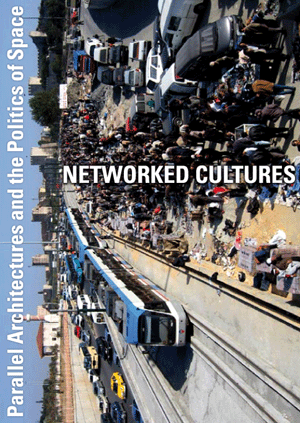_login
registrieren
_5 Factories - Worker Control in Venezuela Dario Azzellini & Oliver Ressler
_ALMOSTREAL ECF
_AnArchitektur Jesko Fezer
_Arizona Road Azra Aksamija
_Balkan Konsulat rotor
_Bata-ville: We are not afraid of the future Nina Pope + Karen Guthrie / www.somewhere.org.uk
_Black Benz Race krcf in collaboration with Felix Stalder, Arben Gecaj, Faton Topalli and Osman Osmani
_Black Sea Files Ursula Biemann
_Camp La Jolla Military ParkOwen Mundy
_CHANGE REALITY: Renaming the Streets of Zagreb REINIGUNGSGESELLSCHAFT
_Conceptual Paradise. There is a place for sophistication Stefan Roemer
_de-regulation Irit Rogoff, Kutlug Ataman, Stefan Roemer

____________Bloomberg SPACE, London
____________Kumu Art Museum Tallinn
____________Open Space, Open Systems - Vienna
____________CAA 2011 Conference, New York
____________Forum Stadtpark, Graz
____________Symposium, Istanbul
____________lungomare, Bozen/Bolzano
____________Metropolis Biennale 2007-17, Copenhagen
____________new publication available now
____________Mestna Galerija, Ljubljana
____________Livestream of Networked Cultures documentary
____________
|
_Database
project:
Disobbedienti
location: Bologna & Genoa

date: 2002-07-01
info:
The video "Disobbedienti" thematizes the Disobbedienti's origins, political bases, and forms of direct action on the basis of conversations with seven members of the movement.
The Disobbedienti emerged from the Tute Bianche during the demonstrations against the G8 summit in Genoa in July 2001. The "Tute Bianche" were the white-clad Italian activists who used their bodies - protected by foam rubber, tires, helmets, gas masks, and homemade shields - in direct acts and demonstrations as weapons of civil disobedience. The Tute Bianche first appeared in Italy in 1994 in the midst of a social setting in which the "mass laborer," who had played a central role in the 1970s in production and in labor struggles, was gradually replaced in the transition to precarious post-Fordist means of production. By forcing the closing of detention camps through specially developed acts of dismantling the Tute Bianche became involved in protests against precarious working conditions and the immigrants' struggle for freedom of movement. The Tute Bianche were part of the demonstration against the WTO in Seattle in 1999 and the IMF in Prague in 2000. They sent delegates to the Lakandon rainforest in Chiapas and accompanied the Zapatist Comandantes 3,000 kilometers to Mexico City.
At the G8 summit in Genoa the Tute Bianche decided to take off their trademark white overalls that had given them their name and instead blend in the multitude of 300,000 demonstration participants. The transition from the Tute Bianche to the Disobbedienti, the disobedients, also marked a development from "civil disobedience" to "social disobedience." The repressive actions and massacre by the police force in Genoa brought the practice of social disobedience in from the streets to the most diverse social realms. In the video, the Disobbedienti spokesperson Luca Casarini describes the Tute Bianche as a subjective experience and a small army, whereas Disobbedienti is a multitude and a movement.
Disobbedienti maintains the political form of the Tute Bianche and attempts to create a better legal justice for and from the people. Spectacular actions are still being carried out against detention centers, such as the dismantling of the detention camp in the Via Mattei in Bologna on 25 January 2002, as shown in the video. Additionally, attempts are being made to further develop "social disobedience" as a collective practice of various groups, to block the flows of goods and communication, to make general the strikes of individual groups, and to plan and carry out general strikes.
The conversations with the Disobbedienti were carried out in Italian in Bologna and Genoa in July 2002. There are two versions of the video "Disobbedienti," one with German and one with English subtitles.
Concept, interview preparation, editing, realization: Oliver Ressler
Interviews, conceptual work, translation: Dario Azzellini
Camera: Claudio Ruggieri
Sound: Rainer Antesberger
Interview partners: Luca Casarini, Ulia Conti, Gianmarco de Pieri, Enrico Ludovici, Federico Martelloni, Francesco Raparelli, Francesca Ruocco
http://www.ressler.at/disobbedienti/
|
+ Ana Dzokic and Marc Neelen
+ Ayreen Anastas and Rene Gabri
+ atelier d'architecture autogérée (aaa)
+ Asya Filippova
+ Sophie Hope and Sarah Carrington
+ Branca Curcic
+ Christoph Schaefer
+ Campement Urbain
+ Claudia Zanfi
+ Despoina Sevasti and Poka-Yio
+ Erden Kosova
+ Helmut Batista
Radio as Spatial Practiceby: Paulo Tavares
Survival Kits: Artistic Responses to Globalizationby: Marga van Mechelen
What Ever Happened to Cultural Democracy?by: Sophie Hope
I don't know how to explain ...by: Anca Gyemant
Trading Placesby: Peter Moertenboeck & Helge Mooshammer
Milosevic as Architectby: Srdjan Jovanovic Weiss
When the Unavoidable Knocks at the Door ...by: Gulsen Bal
Tracing Translocality: The BlackBenz Raceby: Felix Stalder
travelling lexicon towards a global positioning systemby: Celine Condorelli
|


